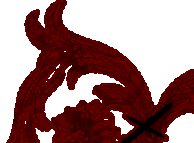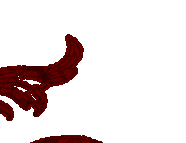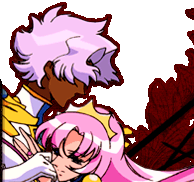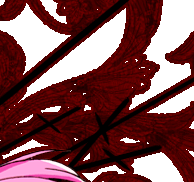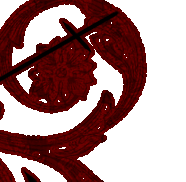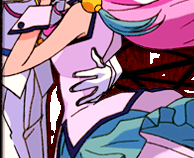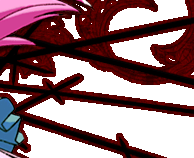
This analysis
was donated by sharnii. 
Himemiya Anthy is a mystery, a multi-faceted character immensely confusing to the other characters of Revolutionary Girl Utena, not to mention the fans. Mistress of the one-liner, she doles out facial expressions like there’s a famine, and switches from victim to puppet-mistress in frames so short that they’re liable to be missed by those unfortunate enough to blink. Ohtori Academy’s denizens themselves are divided as to who Anthy really is… She’s a manipulative bitch (Juri’s pov), sweet girl (Miki), the competition (Kozue), sister/witch/good girl (Akio), rose bride (Anthy’s own pov), friend/victim (Utena), loser/mirror (Nanami), threat (Kanae), possession (Saionji), road to power (Touga), and obstacle to be removed (Mikage). But is Anthy tru ly all those things? Is she any of them?! Appearing in every episode, she’s obviously pivotal to the storyline. Anthy not only stars in the opening and closing credits, she’s the motivation (ostensibly) for the duels or at least for Utena dueling (eventually), and she’s the main focus of the very closing credits. As rose bride she holds the means (somehow) for the victor of the duels to revolutionize the world. Revolutionary Girl Utena is arguably in large part the story of Anthy, of what she was, what she has become, and what she will be. This essay examines that story in past, present and future time frames, in each instance looking to answer the questions: • Who is Anthy?
• What motivates her?  The Past The fairytale memory we are presented with in episode one (and repeatedly thereafter) of the little princess being rescued by the prince is later revealed to have undergone severe editing. In episode 34: Seal of the Rose, Akio walks Utena through her memories, revealing to the audience a third character present at the moment of Utena’s inspiration to become a prince. This naturally is Anthy, whose dire fate compels Utena to want to rescue her. Anthy is the prince’s little sister, and the prince is Dios, whom the audience knows as the ghost who comes down from the castle of eternity to possess Utena. Dios of course is Anthy’s big brother, whom in the present is Akio aka World’s End. In the Tale of the Rose, Akio reveals key facts about Anthy (but not without bias): • Anthy is a witch. This is synonymous with being the rose bride.
• The rose bride cannot die, just goes on suffering instead.
• She is suffering because she stole a prince from all the women of the world.
• She sacrificed herself to save her beloved prince.
• She was the only one who truly loved the prince.
• The prince who loved her (note the change in who is doing the loving) is gone.
• Since the prince is gone now, all she has is her suffering.
• She can only be saved by a prince she believes in.
The younger Anthy in Utena’s memory adds these details: • The prince would die if he kept fighting.
• Dios belongs to her alone, and is sealed away where others can never reach. Thus we see that Anthy is the rose bride by choice, and primarily because of love. Whether right or wrong she has acted to save her beloved brother and prince from something she believes would kill him. It seems that there is also an element of jealousy to her choice, in that she claims Dios is hers alone (not the women of the world’s). Anthy’s sacrifice seems to be made with full knowledge: she faces the roaring mob alone ignoring Dios’ weak protests. In the sense that Anthy is the one performing the sacrifice, Anthy herself takes on the role of priestess. What is most gripping is that the sacrifice is of herself, of her presumably charmed existence. To save her brother (for mixed and rather human motives) she takes upon herself an eternity of suffering. She cannot die, only suffer on and on: even Dios/Akio insinuates that she would be lucky to die. What we have here is an almost miraculous act of self-sacrifice, jealousy notwithstanding. Anthy has been driven by love to give up her future, her intact self, and ironically her beloved brother. It is no wonder that you ng Utena cries, “too cruel” and “save her!” Anthy is presented to us as a victim, a sacrificial lamb who has nothing to fuel her perpetual sacrifice, no warming love from the one she saved. Note also that the form of her punishment is the million swords of hatred, which initially takes the form of a screaming mob and pitchforks piercing Anthy’s body. This metamorphoses into flashes of swords exploding from Anthy that we glimpse occasionally, and then reveals itself fully in the sphere of constantly attacking swords in the sky at the Duel Called Revolution. The point is that Anthy is always suffering, even if we don’t see that, and has been since her sacrifice. She is the priestess of the perpetual sacrifice.  The Present Anthy of the present is no longer Anthy of the past, anymore then Dios dying in his hut is Akio lounging in his tower. It seems a long time (an eternity?) has passed since that initial defining sacrifice, certainly enough time for Anthy, Dios and Utena to grow to maturity, for a hundred boys to die in a fire long ago, and for Anthy to have lost all hope. What’s important is that Anthy is now firmly established in her role as rose bride which in Episode 38: The Ends of the World (in a flashback sce ne) she tearfully self-describes as being “a doll with no heart”. To quote her: “I thought that no matter what befell my body, my heart wouldn’t feel the pain…my suffering is my rightful punishment as the rose bride.” She admits to Utena: “I knew everything.”
(Meaning that she has manipulated people with full knowledge). She uses the words “exploited”, “encroached”, and “unfair”, to describe her actions, and finishes with, “I’m a dirty woman. I’ve betrayed you all along.”
In this rare moment of apparent honesty (where Utena has just prevented Anthy from jumping off the balcony) we have Anthy admitting that she is a puppet-mistress. She’s acted alongside Akio to actively betray Utena (and others), and has reassured herself that she wouldn’t feel any undue emotion as a Judas. She has embraced the role of rose bride, and has been, if you will, the very best rose bride she can be! Earlier we saw that the rose bride is synonymous with witch, and Anthy reveals that being the bride has also meant her heart doesn’t feel pain. Her general lack of facial and tonal expression is actual ly a true indication of her inside state. People are pawns to her; she’s too caught up in the pain of her broken body, and in the heartbreak of losing her prince (which has destroyed her heart) to care what her brother does now. She only cares enough to accept her role by his side and in his bed (her rightful punishment), and accept whatever is left of him. Utena has challenged this, creeping past Anthy’s defenses to awaken something sleeping deep inside. It’s possible of course that Anthy is betraying Utena even as she bares her soul in this scene, but it seems to be written more with the intent of furthering the flowering connection of the show’s key relationship. Of course Anthy will still betray Utena by stabbing her in the back. Even if she did slip for a moment and feel emotion for her “meddlesome hero”, a “taste of friendship” isn’t enough to stop her furthering her brother’s agenda. Anthy has always been primarily motivated by Akio. What we see about Anthy of the present is that her perpetual sacrifice has made her a sacrificer of others. She is a secret priestess (not recognized as such by most of her victims), stabbing her dagger in wherever Akio points her. She has no qualms about playing the piano for Miki (the exact song to stab him through and through), handin g the orange rose to Juri, getting engaged to the Kaoru twins’ father, refusing to call Kanae sister, lying in a coffin for Saionji and Utena, shoving apple into Kanae’s mouth, encouraging Mikage to make black rose duelists, and asking Utena to deliver flowers (well perhaps a small qualm). She acts again and again to manipulate duelists into dueling, and takes an active role in forcing duelists into abusing her (specifically chosen words/taunts to rile up Saionji, Nanami, Juri, and even Akio). Nothing Anthy does is innocent, although it usually has the outward appearance of innocence. Akio outlines his view of her past state in Episode 38:
“I thought that she was a goddess who sacrificed her body for the one she loved, for me.” Followed by his current view: “And she really might have been, once. But now she’s a witch. And she enjoys being a witch…We love each other. She can’t be happy any other way.” The prince who loved past Anthy is gone, but the current version (World’s End) claims he loves her in this incarnation. She is the witch to his Lucifer. He ins inuates she is happy, inasmuch as she can’t be happy in any other way. He says she enjoys being a witch, even while she lies in his lap with a look of deadness and pain on her face. It seems Akio believes what he’s saying, although Utena immediately challenges it and blames Akio for “making Anthy a witch”. Who is right? Anthy has shown evidence of enjoying her game-playing, but at the same time she genuinely appears to be in pain-fogged apathy; here in the final duel she has no reason to put on a pleasant smile anymore. It is Utena who speaks the higher truth when she cries out to Akio: “What kind of shitty ideals makes you use this room to control everybody’s lives?!...What is the value of this room? Making Himemiya suffer more?!” Part of Anthy’s suffering has been directly and perpetually caused by Akio, and she believes this is only what she deserves. Utena is right; Anthy is an innocent victim. Utena is wrong; Anthy is the perpetrator of crimes against other victims, and Anthy has enjoyed it. Anthy is both, but luckily for Anthy Utena only cares about the injustice in the situation, and focuses on her glaring need to save the rose bride. Utena looks at Anthy in the past and is inspired t o save her in the present (despite the present). Anthy feared and believed that when Utena realized the truth about Anthy in the present, she wouldn’t want to save Anthy in the past anymore. Anthy believes that she cannot be saved; there is no prince worth believing in. As Akio says bitterly: “There never was any such thing as a prince anywhere in the world in the first place.” With so much pain and evil between Anthy and Akio, this may as well be true. It certainly seems true for Anthy who obeys her brother to the end, and in Episode 39: Someday, Shine with Me says to Utena: “You remind me of the Dios I once loved.” (note past tense)
“But you can’t become my prince. Because you’re a girl.” Anthy sacrifices Utena to her brother’s cause. Presumably Utena is only one duelist in a long line of duelists, as Akio insinuates when he grumbles: “Once again, even this sword fails?” By sacrificing Utena (her one hope) Anthy re-sacrifices herself, accepting her place to take “the millions swords that shine with people’s hatred” in place of the ex-prince. Akio s ays she draws the swords from the prince to herself, as that is the rose bride’s destiny. He tries to justify this by saying: “Anthy wished for it all herself.” In other words Anthy freely chose her fate, it wasn’t imposed upon her. The nightmarish sacrifice of Anthy being pierced by a million swords is played out in the sky over the arena, while a broken Utena screams below. Of course the miracle of Revolutionary Girl Utena is that the heroine finds the will to keep going, and swallows up betrayal in love. She somehow finds the strength to pry open the rose-shaped gate of which Dios says: “Within that gate is that which is eternal, something shining, the power of miracles. With that power, anything is possible.” When she manages to get it open we see a naked Anthy, lying asleep (in a coffin), opening her eyes for apparently the first time. Anthy’s first disbelieving question is: “Who are you?” And then, “But you’re a…” (girl) Utena cries out:
“I came here to save you…I came here to meet you…So don’t be afraid of this world where we’ll meet…Himemiya!” Anthy finally recognizes Utena by name, and then pleads with her (as her truest self, her awakening self) to flee the swords. We see in this scene and by this plea that Anthy of the present really was only part of who Himemiya Anthy is. The Anthy who sacrificed herself for her brother went to sleep in a coffin (died), just as surely as Dios evolved (by dying) into Akio. By believing in Anthy of the past (the little girl she saw so cruely punished) Utena has resurrected Anthy of the past. She has met the full Anthy for the first time.  The Future (after the anime) Anthy’s hand slips from Utena’s and her coffin falls away from the crumbling arena, leaving Utena to face the deluge of angry swords. We see that Anthy is free, and no longer the bearer of the swords for the prince (for a prince whom she believed in has rescued her). Anthy seems to have more knowledge than Akio about what really happened during the last duel. She tells him: “You don’t know what happened, do you?...It’s alright now. Please go on playing make-believe ‘prince’ in this comfortable little coffin forever. But I must go…That person hasn’t vanished. She’s merely left your world…Farewell.” She tells Utena: “Now it’s my turn to go to you. No matter where you are, I’ll find you for sure. Wait for me, Utena.” Anthy is no longer the perpetual sacrifice, no longer the rose bride who is a witch. She’s said before that all girls become witches but Utena has shown her that a girl can be a prince, against all her expectations. Since Anthy is no longer the sacrifice, she no longer feels the need to play Akio’s game, making sacrifices of others. The Anthy we have known, loved, hated, and feared during the anime is no more. Instead the little girl who gave up everything to save her brother steps to the fore, and steps out Ohtori Academy’s front gate. The self-sacrifice of a princely girl has been enough to revolutionize Himemiya Anthy’s world and way of=2 0being. So just who is Himemiya Anthy of the future? Only Utena will discover that.
 |

